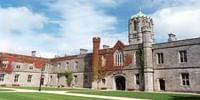What is 'Negotiated Learning'?
Negotiated Learning is a process where a student and academic discuss the components of a qualification required to meet the student's stated goals. In the context of this MSc programme, students will discuss which 40 credits of taught components are appropriate, relating to their current strengths and weaknesses, and their future career goals in industry or academia. The MSc in Biological and Biomolecular Science is the first of its kind offered in Ireland by Negotiated Learning.
What will I learn?
The programme's foundations is a range of advanced laboratory research skills, taught in two 15 credit modules. Added to this, professional skills modules will be delivered, inlcuding Students have the opportunity to negotiate a programme of taught modules that is tailored to their own career goals and requirements. In addition to these taught modules, core components including advanced laboratory research skills and professional skills.
How will I benefit?
You can use this programme to enhance your knowledge and skills according to your previous learning and career objectives. This programme draws on the teaching and research strengths of two large, interdisplinary schools in the College of Science: UCD School of Biomolecular & Biomedical Science and the UCD School of Biological and Environmental Science.
Specialisations
The Biological & Biomolecular Science By Negotiated Learning programme from University College Dublin currently offers specialisations in the following areas of biological and biomolecular sciences:
- Genetics & Cell Biology: investigates cellular signalling, architecture, imaging, trafficking and transport, genetic basis of disease, model organisms, epigenetics, etc.
- Microbiology & Infection Biology: investigates mechanisms of pathogenic micro organisms, host response to infection, immunopathologies, host-pathogen interactions, development of diagnostics, applied microbiology, etc.
- Biochemistry & Synthetic Biology:investigates metabolism and diease, protein-protein interactions, cell signalling, protein structure and analysis.













